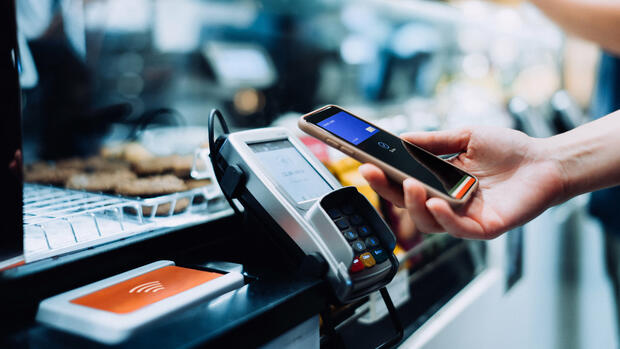Frankfurt A total of 16 European financial service providers, including Deutsche Bank and the savings banks, want to start a new European payment system at the beginning of next year. Specifically, it is planned that banks from Belgium, Germany and France will then introduce an app for mobile-to-mobile payments. Other countries are to follow, as the European Payments Initiative (EPI) announced on Tuesday morning.
In addition, EPI wants to offer payment in online shops by the end of 2024 and also payments at the checkout in the course of 2025. “Then customers will also be able to use their bank card – in Germany, for example, the Girocard – as well as debit and credit cards from international providers for EPI,” EPI boss Martina Weimert told Handelsblatt. Because in addition to account-to-account payments, EPI will enable the integration of the cards.
The big banks BNP Paribas and Société Générale from France, ING from the Netherlands and KBC from Belgium as well as the payment service providers Worldline and Nexi are involved in EPI. The Dutch money houses ABN Amro and Rabobank are newcomers.
Payconiq is also to go to EPI
With the announced app, EPI would be launching an initial offer four years after the prestige project became known. The aim is to counter the US online payment service PayPal and the American credit card companies Mastercard and Visa. According to the EPI Company, EPI should “ensure Europe’s independence in payment transactions”.
However, EPI is a late start – and in an already competitive market. Since Paypal has long played a major role, with around 29 million active private users in Germany alone, and credit card payments are popular in many countries, EPI’s chances of success are unclear. The German online payment service Giropay has not managed to establish itself and achieve a significant market share.
EPI wants to start after two acquisitions. The EPI company intends to take over the Dutch payment service iDEAL, through which a significant part of the local e-commerce payments are processed, and its service provider Payconiq International. EPI did not name a purchase price. The industry service “Platow Brief” first reported on the transaction.
>> Read more here: Apple attacks banks and fintechs
“The Dutch central bank signaled last week that it had no objections to the takeover,” said Weimert. However, EPI is still waiting for the final approval of the supervisory authorities.
According to Weimert, EPI wants to set up its own payment solution, but in future will be able to access the know-how of iDEAL and Payconiq, for example with a view to security issues. Only when the offer for e-commerce payments has been launched in other countries will iDEAL migrate to EPI. According to Weimert, EPI currently has 50 employees, iDEAL has 26 and Payconiq International has 140 employees.
Financial institutions withdrew from the project
Originally, more banks were involved in the project. A number of financial institutions, including many small Spanish banks, withdrew about a year ago. At that time, investments of around 1.5 billion euros were estimated. Since then, the remaining financial service providers have been working on plans for a slimmed-down EPI version.
The German cooperative banks also dropped out at times because they did not agree with EPI’s orientation at the time. In the meantime, however, its leading institution, DZ Bank, is once again one of the EPI participants.
EPI originally wanted to set up a new payment system with a separate payment card. This should replace the different cards in the respective countries. In Germany it would have been about the Girocard, better known by its old name “EC card”. According to the new plan, maps that are already established should be able to be stored in the EPI app.
Commerzbank is not yet part of it
At the same time, EPI functions such as the planned cellphone-to-cellphone payment system should also be controlled via their banking app – which would change little for consumers. In any case, such a mobile phone payment system has long existed in Germany under the name “Kwitt”. Kwitt is to be switched to EPI.
The head of the EPI Company relies primarily on real-time payments for the planned offer.
(Photo: Oliver Wyman)
Commerzbank is currently not a shareholder of EPI and is therefore the only large private customer bank in Germany not involved in the project. However, people familiar with the topic believe it is conceivable that the bank will join at a later date. Board member Jörg Oliveri del Castillo-Schulz had already declared at the end of 2022 that the institute found the wallet solution now being promoted by EPI interesting. “Against this background, we are discussing how to proceed,” confirmed a Commerzbank spokesman.
However, EPI apparently did not want to wait for a final decision from the Commerzbank board of directors and has therefore already given the official go-ahead for the project. According to financial circles, this is also due to the fact that it is not decisive for the success of EPI whether Commerzbank participates or not.
More: ECB – Digital euro initially benefits residents of the euro area in particular
